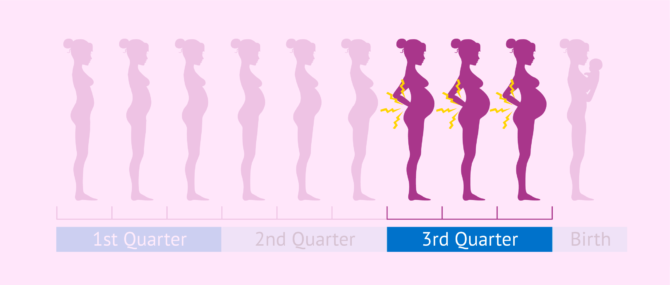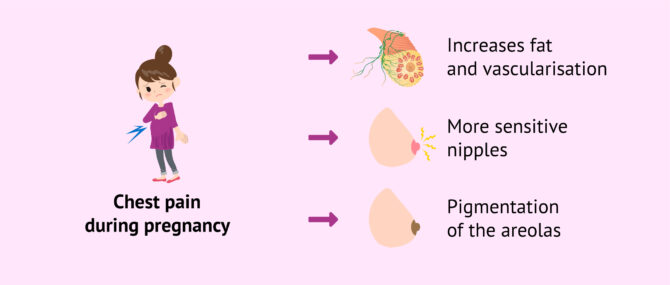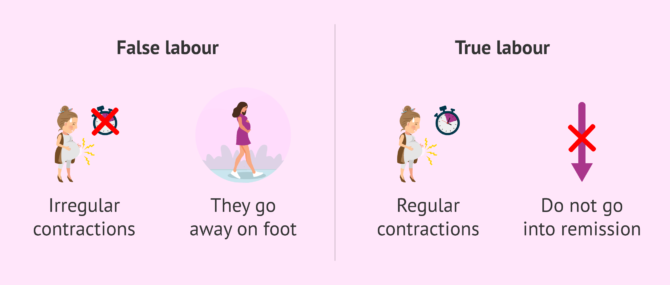Feeling discomfort during pregnancy is a common occurrence that happens to a greater or lesser degree to almost all pregnant women. Headaches, back pain, breast pain and lower abdominal pain are the most common.
If these symptoms worsen, it is advisable to consult a physician. Generally, the discomfort that arises during pregnancy is not a sign of alarm and does not prevent you from continuing with your normal rhythm of life.
In the first months of pregnancy, the changes that arise in the woman make her feel new sensations and symptoms that may be uncomfortable. As the pregnancy progresses, these minor discomforts will change and become more uncomfortable as the time of delivery approaches.
Provided below is an index with the 11 points we are going to expand on in this article.
- 1.
- 2.
- 3.
- 4.
- 5.
- 6.
- 6.1.
- 6.2.
- 6.3.
- 7.
- 8.
- 8.1.
- 8.2.
- 8.3.
- 8.4.
- 8.5.
- 8.6.
- 9.
- 10.
- 11.
Headache
Headaches are a fairly common symptom among pregnant women in the first trimester of pregnancy. The woman may feel a constant pressure on both sides of the head or at the back of the neck.
In addition, if the woman was already prone to headaches before pregnancy, it is common for this type of discomfort to worsen with pregnancy.
Specialists do not know exactly why headaches tend to be more frequent during pregnancy. The most accurate hypothesis is the change in hormones characteristic of pregnancy.
Tiredness, heaviness, stress or lack of sleep can also cause headaches. After the first few months, when the hormonal situation is balanced, these pains tend to disappear or become less frequent and intense.
Back pain
About 80% of pregnant women suffer from back pain, making it the most common discomfort during pregnancy.
Back pain becomes more severe during the third trimester of pregnancy and almost 50% of women experience low back pain.
The weight carried by the abdomen in the later months of pregnancy affects balance and posture, creating tension in the lower back. It is best to wear low-heeled shoes, place a pillow on the lower back when sitting to relieve pain and rest as long as possible.
Cramps and swelling of the ankles
Generally, this type of pain is felt in the calf muscles and is usually caused by a lack of calcium and magnesium in most cases.
A large number of pregnant women suffer from swelling in their legs due to the extra blood supply that provides circulation to the placenta and the baby.
The uterus also puts pressure on the blood vessels that supply blood to the lower half of the body, which can lead to fluid accumulation in the legs. Therefore, it is essential to drink plenty of water daily, limit salt in food, rest your feet on a pillow, wear comfortable cotton clothing and sleep lying on your left side.
Colic and abdominal pain
Throughout pregnancy it is common to feel pain or discomfort in the abdominal area. This is normal and is usually of short duration. If the pains in the belly are severe or you suffer from cramps, you should consult with your pregnancy health care provider, especially if the cramps are accompanied by any vaginal bleeding, chills, dizziness, fever or fainting.
Minor pain or discomfort in the lower abdomen will accompany the different stages of pregnancy and may have various causes:
- Pressure of the growing uterus.
- Constipation.
- Heartburn
- Gases
- Small contractions.
When these pains appear, the best thing to do is to sit down and elevate the legs, trying to relax the body. Do not change position abruptly. Taking a short walk also helps to relieve pain and tension in the abdominal area.
Breast Pain
The woman's breasts will increase and prepare for breastfeeding. To do this, female hormones (prolactin, progesterone, estrogen and placental hormones) cause changes in the pregnant woman's breasts, which can cause pain and be uncomfortable for the woman.
Some of the changes that take place in the pregnant woman's breasts are:
- Increases fat and vascularization.
- The nipples become more sensitive.
- The areolas become pigmented and small bumps known as Montgomery tubercles appear on them montgomery tubercles.
In short, feeling discomfort due to these changes in the chest is normal, although if the intensity is very strong, it is recommended to consult a specialist.
Other discomforts during pregnancy
Although the aforementioned pains are the most frequent among pregnant women, this does not mean that there are no other types of discomfort. In addition, there are women who go through the entire pregnancy without feeling too much discomfort.
Therefore, the presence or absence of pain during pregnancy does not mean that the pregnancy is going well or badly, but will depend on the body of each pregnant woman.
Leg pain: varicose veins and hemorrhoids
Varicose veins are swollen, twisted or dilated veins. These types of veins usually appear on the legs and cause heaviness and slight swelling.
Hemorrhoids are also varicose veins that occur in the rectum. The main cause of hemorrhoids during pregnancy is increased blood volume.
To prevent any type of varicose vein, it is helpful to eat a diet high in fiber (fruits, vegetables, whole grains), drink plenty of fluids and avoid standing for long periods of time.
Pain during implantation
In early pregnancy, when the embryo is taking root in the uterus, pain similar to that felt during menstruation may be felt. Some women also experience a slight pinkish bleeding that is sometimes even mistaken for menstruation.
However, menstruation and implantation bleeding have different characteristics. The intensity, color or duration of the bleedings is different. In any case, pain during the implantation of the embryo in the uterus occurs both in natural pregnancies and in pregnancies after assisted reproduction treatments.
Therefore, women undergoing embryo transfer or artificial insemination (AI) may also experience abdominal pinching as a result of embryo implantation.
Nevertheless, the fact remains that the presence of pain after reproductive treatment such as those mentioned above does not necessarily confirm that pregnancy has occurred.
False labor
False labor may occur between the second and third trimester of gestation and consists of the woman feeling contractions or tightening of the muscles of the uterus. This is called braxton-Hicks contractionsand are irregular contractions.
Therefore, false labor contractions differ from true labor contractions in frequency. Normally, when a woman goes into labor, she has regular contractions at 5-10 minute intervals.
Another difference between false labor and true labor contractions is that Braxton-Hicks contractions usually subside when the pregnant woman takes a walk. In contrast, if it were true labor, walking would not be an option for relieving contractions since it would not be effective.
How to relieve the pain of pregnancy?
It is important that pregnant women do not self-medicate or take any pharmacological substance without first consulting their gynecologist.
There are some medications that can affect fetal development and, therefore, it is important to consult early.
Do not overexert yourself, rest the necessary hours, take walks and change your posture are some of the general tips that help to alleviate or reduce the minor discomforts associated with pregnancy.
FAQs from users
Is it normal to have menstrual pain during pregnancy?
Menstrual cramps are mainly caused by female hormones released during the menstrual cycle. During pregnancy, there is a special hormonal situation that can intensify some of the common discomforts of menstruation. For this reason, many women say that they experience menstrual cramps during pregnancy.
I have felt pain in my navel, does it indicate something bad for the pregnancy or should I not worry?
During pregnancy, a woman's navel undergoes changes due to the enlargement of the abdominal area. It is common that towards the end of pregnancy, the navel protrudes or bulges due to the pressure that the uterus is exerting on it. This may cause a little pain, but it is not a cause for concern.
What can I do to relieve muscle pain during pregnancy?
Due to the changes in the pregnant woman's body, it is common to feel pain in her muscles that prevents her from carrying out her usual activities or causes general discomfort. In these cases, stretching is recommended to keep the joints strong and not to overload the muscle.
In addition, it is important not to gain more weight than recommended. Finally, it is also advisable to reduce the intensity of physical exercise. You should do sport, but adjust the intensity to your gestational state.
Is it common for my ovaries to hurt in the first days of pregnancy?
Ovarian pain can occur throughout pregnancy. Although it can be confused with the ovarian pain characteristic of ovulation, it is caused by the uterine ligaments preparing for the moment of delivery.
Is constipation a normal symptom of pregnancy?
Yes, one of the causes of constipation is an increase in progesterone, which slows the passage of food through the digestive system. In addition, the uterus puts increasing pressure on the rectum.
To prevent or relieve constipation, it is advisable to eat high-fibre foods, drink plenty of water and exercise regularly.
In case of acute constipation accompanied by abdominal pain or alternating with diarrhoea, mucus or blood in the stool, a woman should see a doctor, as this may indicate the presence of another problem.
Can haemorrhoids occur during pregnancy?
Yes, constipation problems can lead to painful haemorrhoids. They usually occur during the last trimester and after vaginal delivery.
They are thought to be the result of slowed venous return associated with an enlarged uterus, as well as increased pressure inside the woman's womb.
You can try to prevent their occurrence by consuming fibre in your diet, drinking plenty of fluids and exercising. Treatment to reduce swelling and inflammation is analgesic ointment, rest and cold baths. Astringent anti-hemorrhoidal creams and suppositories with hydrocortisone also help.
Suggested for you
Many women notice some pregnancy symptoms even before their period is late. If you want to know more about it, you can visit this link: First signs of pregnancy before menstrual delay.
In addition to discomfort during pregnancy, changes also occur in the woman's body. One of them affects the position of the cervix to prepare for childbirth. Here is the link in case you want to know more: Changes and position of the cervix during pregnancy.
We make a great effort to provide you with the highest quality information.
🙏 Please share this article if you liked it. 💜💜 You help us continue!
References
Arrigo Fruscalzo, Paolo Cocco, Ambrogio P Londero, Markus Gantert. Low Back Pain during Pregnancy and Delivery Outcomes. Z Geburtshilfe Neonatol. 2022 Apr;226(2):104-111. doi: 10.1055/a-1553-4856. Epub 2021 Aug 25 (View)
Jiaman Yang, Yi Wang, Jianmei Xu, Zhiwen Ou, Ting Yue, Zhitao Mao, Ying Lin, Tao Wang, Zhen Shen, Wei Dong. Acupuncture for low back and/or pelvic pain during pregnancy: a systematic review and meta-analysis of randomised controlled trials. BMJ Open. 2022 Nov 21;12(12):e056878. doi: 10.1136/bmjopen-2021-056878 (View)
Mitchell S Cappell, David Friedel. Abdominal pain during pregnancy. Gastroenterol Clin North Am. 2003 Mar;32(1):1-58 (View)
FAQs from users: 'Is it normal to have menstrual pain during pregnancy?', 'I have felt pain in my navel, does it indicate something bad for the pregnancy or should I not worry?', 'What can I do to relieve muscle pain during pregnancy?', 'Is it common for my ovaries to hurt in the first days of pregnancy?', 'Is constipation a normal symptom of pregnancy?' and 'Can haemorrhoids occur during pregnancy?'.









